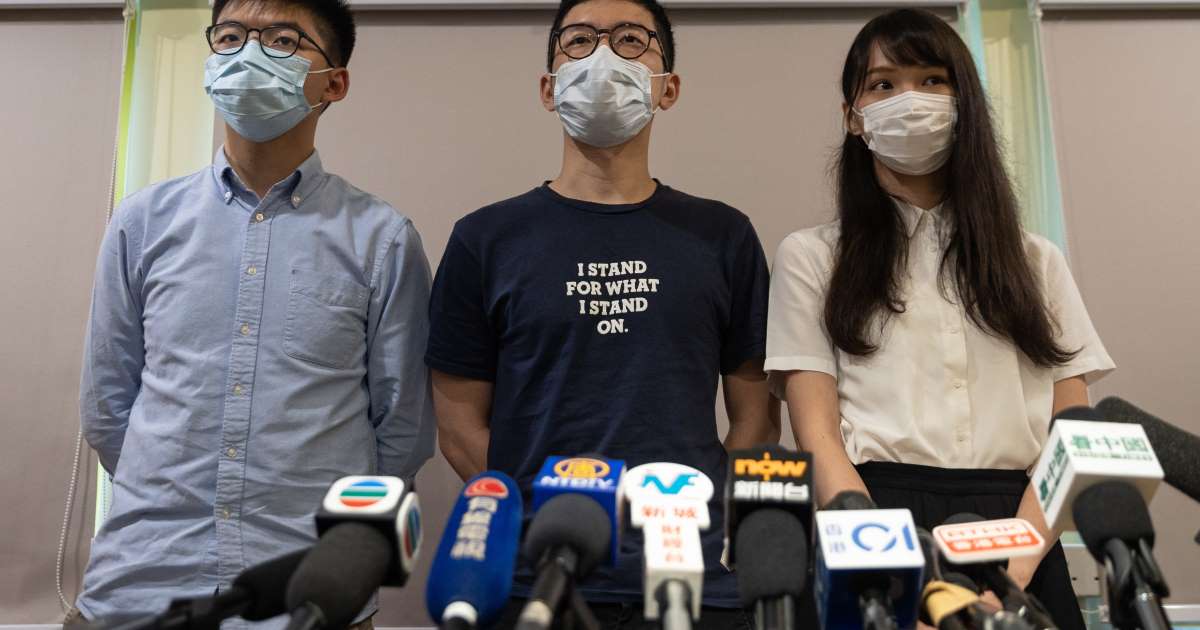
Hong Kong pro-democracy group Demosisto announced it will disband following China’s enactment of a “National Security Law” that extends Beijing’s control over the semi-autonomous city. The decision to disband came hours after three of the group’s leading activists, Joshua Wong, Nathan Law and Agnes Chow, issued statements saying they were stepping down from the organization under threat of “political imprisonment.”
“From now on, Hong Kong enters a new era of reign of terror, just like Taiwan’s White Terror, with arbitrary prosecutions, black jails, secret trials, forced confessions, media clampdowns and political censorship,” Wong said on Twitter, in a reference to right-wing repression under the Chiang Kai-shek dictatorship. “With sweeping powers and ill-defined law, the city will turn into a secret police state. Hong Kong protesters now face high possibilities of being extradited to China’s courts for trials and life sentences.”
Demosisto was founded in 2016 to push for pro-democratic reforms such as universal suffrage for Hong Kong.
The pro-independence formations Hong Kong National Front and Studentlocalism also announced that they are disbanding. Both said their overseas chapters in Taiwan and the UK would carry on their work, promoting independence for Hong Kong abroad.
The National Security Law was approved by a unanimous vote of the National People’s Congress Standing Committee on June 30. Under the law, acts of “secession,” “subversion,” “terrorism,” or “collusion” with a foreign power carry a minimum of 10 years and maximum of life in prison. (HKFP, HKFP, HKFP, BBC News, NYT)
Photo: ANSA





Hong Kong protests met with mass arrests
On July 1, 23rd anniversary of Hong Kong’s handover to China, thousands of protesters again filled the street—to be met with tear-gas, water-cannons and mass arests. Some 370 were detained. (Al Jazeera, HKFP, HKFP) One of those arrested, for carrying a flag that read “HONG KONG INDEPENDENCE” in both Chinese and English, is apparently the first to be charged under the new National Security Law. (RTHK)
Extraterritoriality measure in HK security law
A kind of extraterritoriality clause is apparently included in the new Hong Kong security law, extending the global reach of Chinese law enforcement. “If you’ve ever said anything that might offend [China] or Hong Kong authorities, stay out of Hong Kong,” said Donald Clarke, an expert on Chinese law at George Washington University. (HKFP)
Talk about cycles of history. Resentment of “extraterritoriality”—the principle that foreign nationals on Chinese soil were subject to the law of their own nations rather than China—was instrumental in the rise of China’s revolutionary movement in the first half of the 20th century. And now it has come to this.
Police powers expand under HK security law
Hong Kong police will be authorized to conduct searches at private properties without a warrant, restrict suspects’ movements, freeze their assets, intercept communications and require internet service providers to remove information, as the city’s leader handed more powers to the force for implementing the new national security law. On July 6, the government gazetted the details of Article 43 of the controverisal legislation, after the first meeting of the Committee for Safeguarding National Security of the HKSAR, chaired by Chief Executive Carrie Lam. (HKFP)
Hong Kong protesters subvert Maoist propaganda
Across Hong Kong, restaurants, shops and other small businesses participating in the “yellow economy” in support of anti-government protests are now displaying Mao-era propaganda posters with slogans such as “Revolution is No Crime! It is Right to Rebel!” and “Carry the Revolution Through to the End.” (Bloomberg)
CCP to crack down on Maoist iconography?
Well, this is pretty hilarious. In a bid to outwit CCP censorship, HK protesters have resorted to veiled forms of dissent—such as reviving Mao-era propaganda posters extolling the “right to rebel.” So in trying to stay ahead in this cat-and-mouse game of iconography, the CCP dictatorship is now attempting to criminalize the surrogate symbols under the National Security Law—which could mean prosecuting those invoking the party’s own Great Helmsman. See this account in the New York Times.
Yet another to file under “Orwell would shit.”
Switzerland grants China extraterritoriality
Switzerland is considering renewal of a five-year pact with China that allows security officials of the People’s Republic to operate within its territory. The supposed immigration enforcement deal allows Chinese officials to visit Switzerland for up to two weeks to interview and remove nationals who have been found to be residing illegally in the European country and take them back to China.
While Switzerland maintains similar agreements with immigration authorities from 52 other countries and territories, including Hong Kong and Macau, its deal with China is unique in that it grants powers to China’s Ministry of Public Security as opposed to immigration officials, according to the rights group Safeguard Defenders. (Al Jazeera)